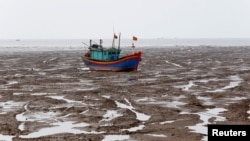A capsized Vietnamese fishing boat that Hanoi says was hit by a Chinese vessel in contested waters is the latest in what scholars call a string of often unreported maritime mishaps between the two sides despite official efforts to get along.
The fishing boat carrying a crew of five capsized on March 6 near the Paracel Islands, a group of South China Sea islets claimed by both countries but controlled by China.
The National Committee for Incident-Natural Disaster Response and Search and Rescue in Hanoi says a Chinese vessel rammed the boat near Discovery Reef due east of Vietnam and southwest of Hong Kong, according to the news website VnExpress International. Another Vietnamese fishing boat rescued the crew, the report says. China rejects blame for the mishap.
Although the capsized boat is the biggest publicized incident at sea since a May 2014 mass boat ramming incident, Asian maritime scholars call it one in a series.
“This matter is not a special matter,” said Huang Kwei-bo, vice dean of the international affairs college at National Chengchi University in Taipei. Each side stands ready to repel the other, he said, meaning ultimately boat crews get hurt.
“More or less, these things have happened before. Normally you'll see when relations are good, these things are covered up but when they're not, the incidents are made bigger,” Huang said.
Maritime clashes, diplomatic repair work
China and Vietnam are the two most outspoken rival claimants to parts of the 3.5 million-square-kilometer sea that stretches as far south as the island of Borneo. The two communist neighbors also fought a land border war in the 1970s, causing long-term distrust between governments.
China and Vietnam got into two landmark, deadly naval clashes, in 1974 and 1988, over control of the sea that’s prized for fisheries as well as fossil fuel reserves. The 2014 boat-ramming incident followed the placement of a Chinese oil drilling rig in the South China Sea.
Smaller clashes take place without causing much uproar, said Jay Batongbacal, international maritime affairs professor at University of the Philippines.
In 2011, for example, a Chinese patrol vessel “reportedly cut the exploration cables” of a Vietnamese seismic survey ship in Vietnam’s exclusive maritime economic zone, according to a 2018 study by the ISEAS Yusof Ishak Institute in Singapore.
Repair work
Communist party envoys often meet after incidents at sea to foster a period of calm. Each side depends on the other economically. China looks to Vietnam as a place to sell raw materials for manufacturing, while Vietnam counts China as its biggest export market.
But to prove their maritime sovereignty claim, Vietnamese authorities sometimes encourage fishing vessels to violate China’s unilateral moratorium on fishing in disputed waters, said Trung Nguyen, international relations dean at Ho Chi Minh University of Social Sciences and Humanities.
Anti-China sentiment runs high among regular Vietnamese citizens too, and the government can tap into that when it needs a shot of public support.
Vietnamese news media initially did not identify China as a player in the March 6 mishap, Nguyen said. He suspects the Communist Party eventually gave the media a "green light."
“I think that the party-to-party relations have to figure out a way to solve the problem, otherwise similar incidents can happen in the future,” Nguyen said.
Two-way relations are “not bad” at the moment, Huang said, noting Vietnam’s recent inclusion under China’s pan-Asian Belt-and-Road infrastructure development plan. The two sides also still live by a 2011 agreement to solve their maritime disputes through negotiations.
Code of Conduct
The March 6 incident may become a talking point between China and the 10-country Association of Southeast Asian Nations as they negotiate a maritime code of conduct by 2021, analysts believe. Association members Brunei, Malaysia and the Philippines vie with China over claims to the same sea. Vietnam is also a member.
A code would spell out how naval and coast guard vessels, including drones, can avoid accidents, Huang said, but it’s unclear whether it would apply to private vessels. China and the Southeast Asian bloc have talked about a code since 2002, with China delaying it part of that time. Beijing has the strongest military position among claimants to the disputed sea.
Other countries would consider backing code proposals to stop incidents like the one March 8, Batongbacal said.
“I'm sure that this incident will be considered by other countries in discussing the code of conduct, so Vietnam’s proposals I’m sure will have some bearing on that,” he said.




